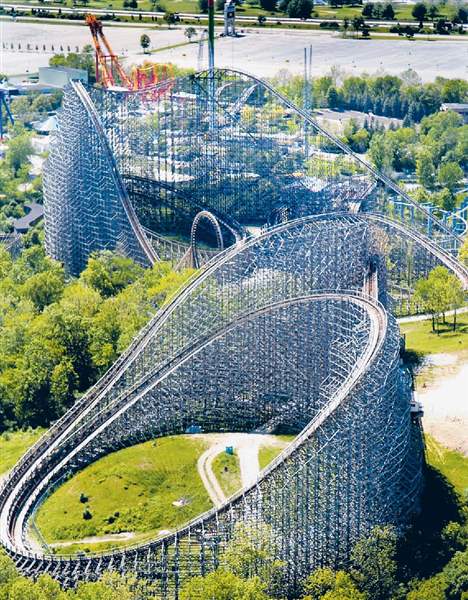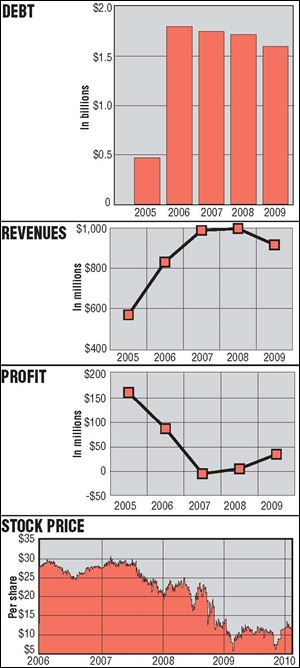
A deal born of a debt load: Cedar Fair will be OK, with sale or without, analysts say
2/14/2010
Kings Island near Cincinnati, wth the Son of Beast roller coaster, was part of the Paramount Parks purchase by Cedar Fair.
SANDUSKY — Saddled with debt and forced to eliminate its quarterly dividend, Cedar Fair LP had to decide last fall what kind of ride to board for its future.
Its financial options weren't strong, with attendance down and a national recession curbing entertainment spending.
The Sandusky amusement park company needed a way to pay down its debt. A sale was a possibility, but there was no line of parties seeking to buy a ticket.
The firm didn't seem headed for bankruptcy, as its rival Six Flags Inc. did, but it faced the possibility of being in default of its loans, which topped $1.6 billion from its 2006 purchase of Paramount Parks, analysts said.
So, Cedar Fair Chief Executive Dick Kinzel announced on Dec. 17 the firm's $2.4 billion acquisition by Apollo Global Management LLC, a New York private-equity firm. Apollo would take Cedar Fair private, arrange new terms for its debt, and pay shareholders $11.50 a share, a premium from the $9 price of the stock before the deal was announced.
Now, two big shareholders have revolted, opposing the deal because, they say, the purchase price was too low. Analysts say they could kill the transaction, which goes to a stockholders' vote on March 16.
But industry experts don't think the operator of 11 amusement parks and six water parks across the country will have difficulty reducing its debt or staying solvent whether the deal is completed or not.
“They've been pretty tight-lipped about a scenario that involved them remaining public, or what is their financial condition going to be like,” said Jeff Thomison, an analyst with Hilliard Lyons LLC of Louisville.
“I've posed the question, but only got some answers. They're seemingly not anxious to talk about it.”
Scott Hamann, an analyst with KeyBanc Capital Markets in Cleveland, said that even before the Apollo deal, Cedar Fair's financial position was sound and nowhere near a Chapter 11 bankruptcy, the route that Six Flags took in June.
“They were on the path to fixing their balance sheet by paying down debt,” he said. From its original $1.77 billion in debt in 2006, Cedar Fair has reduced the amount owed to $1.6 billion.

When Cedar Fair bought Paramount Parks in 2006, its amount of debt soared, as did its revenues. The Sandusky amusement park company has had some tough years since then, with losses, limited profits, and slow revenue increases. Its financial picture, including its debt level, has hobbled its stock price, analysts say.
If the Apollo deal is completed, the debt levels that have concerned investors will be addressed, and the company will no longer have public stock or worries about keeping its stock price up, analysts said.
If the deal is scuttled, the company will be in a better position to pay off its debt because it will have two big shareholders holding nearly 30 percent of its stock.
Analysts say those holders won't be as concerned about resuming the dividend, so that payout could go toward loans.
But Justin Lumiere, head of the special situations/risk arbitrage group for Summit Securities Group of New York, doesn't think Mr. Kinzel and the rest of Cedar Fair's management will have an easy time if the Apollo deal falls apart.
The two big shareholders — hedge funds Q Funding III and Q-4 Funding, controlled by Texas investor Geoffrey Raynor and mutual fund Neuberger Berman LLC — could direct Cedar Fair management to sell land to raise money for debt payments or could make other demands, Mr. Lumiere said.
The two shareholders, each of which bought up additional stock after the Apollo deal was announced, could seek seats on Cedar Fair's board.
Mr. Raynor's two hedge funds and his personal investments control about 18 percent of Cedar Fair's stock, and Neuberger Berman holds nearly 10 percent.
The Knott family, founders of Knott's Berry Farm in California, which Cedar Fair acquired in 1997, could line up with the investment funds.
The family, with 3.6 percent of the stock, has stated displeasure with the sale but has not indicated how they will vote.
If 34 percent of shareholders vote against the Apollo deal, it will be dead. Apollo's $11.50 share-price offer amounts to $635 million. The stock, traded under the symbol FUN on the New York Stock Exchange, closed Friday at $11.44.
At the time the Apollo deal was announced, Mr. Kinzel said: “We've been hit as hard by the recession as anyone has. We think it's in the best interest of the unit [share] holder to do this deal.”
He contends the $11.50 price is fair, and no other bidders came forward during a 40-day period after the announcement.
Steven Davidoff, a mergers expert, former corporate lawyer, and a law professor at the University of Connecticut, said it is unlikely Apollo will raise its offer to try to get shareholder approval. “I think they're financially savvy individuals. I don't think they want to overpay for assets and they have the discipline to not do that,” he said. “No other bidders have emerged.”
Stacy Frole, Cedar Fair's director of investor relations, said that whatever happens, the company is prepared for the 2010 season.
“Throughout this whole process we continue to move forward with our operations, because whether we're sold or not we still have parks to run. That part of our strategy has not changed,” she said.
Mr. Thomison, the Hilliard Lyons analyst, said that, far from the picture of struggle that was Cedar Fair in December, the company has promising prospects.
At the start of the fourth quarter last year, Cedar Fair's overall company value was not high enough — under the terms of its agreement with its lenders — to allow it to pay shareholders a dividend, something it had done for 22 years. So the dividend, an incentive for many individuals to invest in the firm, was eliminated.
“Now without the distribution, they have plenty of cash flow to start paying down debt and de-leveraging the company,” Mr. Thomison said.
Mr. Hamann, the analyst with KeyBanc Capital, said the company has stated it is not in danger of defaulting on its debt. To stay out of default, the company's total value (as measured in its earnings before interest, taxes, depreciation, and amortization) had to be at least $293 million by the end of 2009. It was $300 million.
Cedar Fair announced last week that it had a profit of $35.4 million last year on reduced revenues of $916 million. It had a $4.5 million loss in 2007 and a profit of just $5.7 million in 2008.
Its debt soared in 2006 when it purchased Paramount Parks. Some analysts and investors criticized that purchase as overburdening Cedar Fair because of the amount of debt it took on.
Cedar Fair's premier park remains Cedar Point in Sandusky, but in the Paramount purchase it snapped up other key parks, including Kings Island near Cincinnati and Canada's Wonderland near Toronto.
The recession hurt the amusement park industry as people stopped or reduced spending for such entertainment. But Mr. Hamann said the industry has bottomed out.
“2009 is the worst we'll ever see on consumer discretionary spending side,” he said. “2010, while it may not be dramatically better, it will not be dramatically worse.”
Rick Munarriz, an analyst for the Motley Fool online investor Web site, said, “I don't think this is a do-or-die summer for the company. Most companies are going to have a decent summer compared to last summer, so there's no reason to think [Cedar Fair] will do worse.”
Mr. Hamann said Cedar Fair has positioned itself well by building $20 million roller coasters at two of its parks, Carowinds near Charlotte, N.C., and Kings Dominion near Richmond, Va., and a $10.5 million water ride at Cedar Point. And its Kings Island park will benefit by Six Flags' announcement this month that it is closing its Kentucky Kingdom amusement park in Louisville, a two-hour drive from Cincinnati.
“In this industry, you need to feed the beast. You've got to bring people in and you've got to spend money — on new attractions — to do that,” Mr. Hamann said. “I think they were on the path to being in good shape this year.”
Robert Routh, an analyst with Wedge Partners LLC of Denver, said Cedar Fair had been reluctant to cut its dividend because of the high volume of individual investors wanting the payout.
But now it has big shareholders who may be less concerned about having that payout and who may “applaud” its elimination if the share price rises after debt is reduced, he said.
Mr. Raynor and Neuberger can sit on their shares for a few years, wait for the share price to rise, then cash out, he added. “They can sit on it for 10 years if they have to,” he said.
Mr. Lumiere, with Summit Securities Group, said his analysis of Cedar Fair's worth determined that its value is $13.19 a share.
Given that Q Funding has paid $12 for some of its shares, would $13 be good enough for it to cash out? Probably not, Mr. Lumiere said.
“I think they're just kind of waiting it out to see what Apollo does. The question is how much do they want. They don't want $13. They're looking for $15, $16.”
Contact Jon Chavez at:jchavez@theblade.comor 419-724-6128.